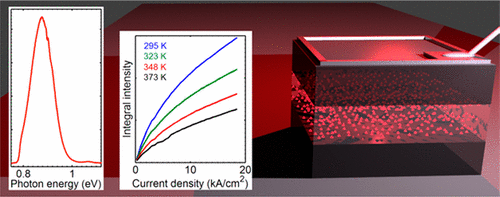当前位置:
X-MOL 学术
›
ACS Photonics
›
论文详情
Our official English website, www.x-mol.net, welcomes your
feedback! (Note: you will need to create a separate account there.)
Room-Temperature Group-IV LED Based on Defect-Enhanced Ge Quantum Dots
ACS Photonics ( IF 6.5 ) Pub Date : 2017-11-10 00:00:00 , DOI: 10.1021/acsphotonics.7b00888 Patrick Rauter 1 , Lukas Spindlberger 1 , Friedrich Schäffler 1 , Thomas Fromherz 1 , Julia Freund 1 , Moritz Brehm 1
ACS Photonics ( IF 6.5 ) Pub Date : 2017-11-10 00:00:00 , DOI: 10.1021/acsphotonics.7b00888 Patrick Rauter 1 , Lukas Spindlberger 1 , Friedrich Schäffler 1 , Thomas Fromherz 1 , Julia Freund 1 , Moritz Brehm 1
Affiliation

|
As recently demonstrated, defect-enhanced Ge quantum dots (Ge-DEQDs) in a crystalline Si matrix can be employed as CMOS-compatible gain material in optically pumped lasers. Due to the stability of their optical properties up to temperatures beyond 300 K, the Ge-DEQD system is a highly promising candidate for the realization of an electrically pumped group-IV laser source for integration in a monolithic optoelectronic platform fit for room-temperature operation. We report on the realization of light-emitting diodes based on Ge-DEQDs operating at telecom wavelengths and above room temperature. The DEQD electroluminescence characteristics were studied spectrally resolved as a function of driving current and device temperature. The experimental results show that the excellent optical properties of Ge-DEQDs are maintained under electrical pumping at high current densities and at device temperatures of at least 100 °C. Furthermore, the emission intensity scales with the number of quantum dot layers embedded into the p-i-n diode structures, thus, indicating the scalability of the approach for large gain material volumes. The presented results form an essential step toward the future demonstration of a CMOS-compatible, electrically pumped room-temperature laser based on Ge-DEQDs.
中文翻译:

基于缺陷增强型Ge量子点的室温IV族LED
如最近所证明的,可以将晶体硅基体中的增强缺陷的Ge量子点(Ge-DEQDs)用作光泵浦激光器中的CMOS兼容增益材料。由于在高达300 K的温度下其光学特性的稳定性,Ge-DEQD系统是实现集成在适合室温操作的单片光电平台中的电泵IV组激光源的极有希望的候选者。我们报告了基于Ge-DEQD的发光二极管的实现,这些发光二极管在电信波长和室温以上工作。研究了DEQD电致发光特性,将其作为驱动电流和器件温度的函数进行了光谱解析。实验结果表明,在高电流密度和至少100°C的器件温度下,在电泵浦下,Ge-DEQD的优异光学性能得以保持。此外,发射强度与嵌入到半导体中的量子点层的数量成比例。因此,p - i - n二极管结构表明了该方法对于大增益材料量的可扩展性。呈现的结果构成了向未来展示基于Ge-DEQD的CMOS兼容,电泵浦室温激光器的重要一步。
更新日期:2017-11-11
中文翻译:

基于缺陷增强型Ge量子点的室温IV族LED
如最近所证明的,可以将晶体硅基体中的增强缺陷的Ge量子点(Ge-DEQDs)用作光泵浦激光器中的CMOS兼容增益材料。由于在高达300 K的温度下其光学特性的稳定性,Ge-DEQD系统是实现集成在适合室温操作的单片光电平台中的电泵IV组激光源的极有希望的候选者。我们报告了基于Ge-DEQD的发光二极管的实现,这些发光二极管在电信波长和室温以上工作。研究了DEQD电致发光特性,将其作为驱动电流和器件温度的函数进行了光谱解析。实验结果表明,在高电流密度和至少100°C的器件温度下,在电泵浦下,Ge-DEQD的优异光学性能得以保持。此外,发射强度与嵌入到半导体中的量子点层的数量成比例。因此,p - i - n二极管结构表明了该方法对于大增益材料量的可扩展性。呈现的结果构成了向未来展示基于Ge-DEQD的CMOS兼容,电泵浦室温激光器的重要一步。











































 京公网安备 11010802027423号
京公网安备 11010802027423号